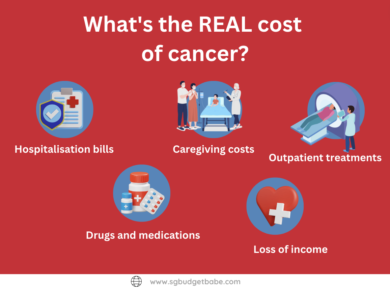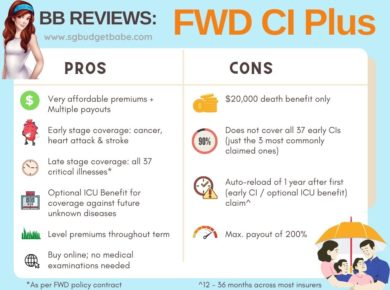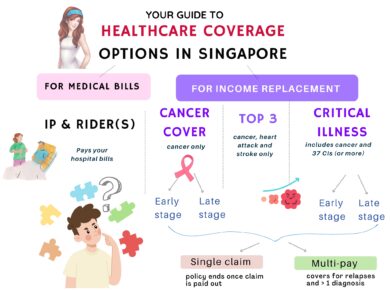Yesterday, I woke up to exciting news which I’ve been waiting for quite some time now.
MAS finally launched their Direct Purchase Insurance (DPI) initiative, allowing consumers to buy basic life insurance products directly instead of having to go through an insurance agent.
This is great news for people like me, who are generally distrusting of financial advisors (and a little more financially savvy than your average Singaporean). I’m not certified, but after reading and evaluating plenty of resources on the topic, I already have a good idea of what I need and what I don’t need.
However, most insurance companies are not very helpful in providing product (brochure) information and price quotations online. You usually have to go directly through an agent to get these details.
The problem I found was that almost all the agents I spoke to still tried to “recommend” sell me investment-linked policies. And every single one of them tried to push for a meet up before sending me the information I wanted. Didn’t work out too well for me, because I’m genuinely busy. Ask any of my friends and they’ll tell you how hard it is to meet up with me because I’m forever busy with either work or dance.
So what does this DPI initiative mean for us as a consumer?
PROS: You can now compare insurance products by different companies 
As part of the initiative, they’ve created an online portal compareFIRST where you can compare the different products available. You’re able to set the coverage period (we usually want to look at either up to 65 years of age, or longer) and sum assured. It will then generate the different estimated quotes from various insurers for you to compare side by side before you decide which you want to go with!
PROS: Skip the insurance agent and avoid paying hefty commissions!
Let’s admit it, most of us know of those insurance agents who always try to hard-sell us certain products (usually ILPs, which gives them the most commissions) that may not be entirely suitable for our needs. This is not surprising, when you consider how most agents are NOT paid a basic salary and are almost completely dependent on commissions for their monthly income.
It is also no secret that life insurance pays the most commissions (I generally group ILPs under life insurance as well). Some insurance companies pay up to 90% commission to the agent on whole life policies, which means if you’re paying $100 a month, $1,080 goes to paying your agent!
 |
| I don’t know about you, but I don’t think anyone should deserve to earn my money that easily. Especially if my agent only sees me once a year, or even lesser. |
I have two acquaintances in this line – one earns $5,000 and another earns $7,000 a month in passive income from recurring customer payment plans alone. This means that if they woke up one day and decided not to work for a month, that’s the amount they still get paid!
Ask yourself, do you want to pay for the COVERAGE or your AGENT?
(Of course, it’s worth paying your agent fees if they’re a good agent who truly looks out for you. But how many of us are lucky enough to find such genuine agents?)
CONS: Limited insurance products
Given that this is a new scheme, there are certain limitations at the moment. The main one is that it covers only limited products, namely:
– Term life insurance
– Whole life insurance
– Critical illness cover rider
– Endowment plans
If you’re looking for other plans such as accident or auto insurance, this portal won’t be of much help to you.
CONS: You cannot buy directly through the portal
We have to go directly to the insurance company offering the product we’re interested in, either at their customer service centres or via their websites.
However, this is already a huge step forward considering the amount of work we had to do in the past! To give you an idea of how much legwork is required, let me share with you what happened when I was trying to compare a few term insurance products. I had to speak with a total of 4 different agents before I finally got the brochures and quotes that I needed to do my comparison. This took me MONTHS because I obviously did not have the luxury of time to meet with each of the agents, and it took a while before I was finally able to meet all of them and gather the quotes and documents to mull over. (This included meeting an independent financial advisor too.)
CONS: Not everyone may know what to buy
Trust me when I say buying insurance is not as simple as your agent will have you believe. For one, there are tons of factors to consider. Even comparing coverage benefits are not as clear-cut as you might think. Furthermore, with so many different insurance products to choose from, how do you know what’s best for you?
Insurance tends to be a long-term (or even a lifetime!) commitment so you will want to make sure you don’t buy into the wrong products, only to have to cancel it afterwards and forgo the premiums you’ve already paid. (Like what I did on my ILP, sigh.)
 |
| Credits: DIYinsurance |
The above is a general table of what type of protection needs you may require at different life stages, but take note that this is only a general guide. Frankly speaking, I disagree with some of the recommendations made here (and will blog more about this next time) but it provides a decent overview for someone who is clueless about insurance to consider.
CONS: You may still need to speak to a financial advisor after all
Because not everyone is properly educated about insurance, and because there are so many terms and conditions to understand, you may not know what product to buy, much less which quotes to look at.
As such, you may still need to speak to an insurance agent who has been trained on insurance products and are able to identify the ones most suited for you. For this to work, though, the agent needs to FULLY understand your circumstances and GENUINELY look out for your interest. He / she needs to be aligned with your needs, instead of being commissions-driven instead.
In reality, I’m skeptical that such an agent exists. There’s also a difference between REAL and PERCEIVED NEEDS. My theory is that the only person who knows your real needs is yourself, and the agent mostly understands your needs as he perceives it to be so. Since I believe that no one knows my needs better than I do, I’d rather skip the agent and do it myself, thank you very much.
I’ll be drafting a post soon on term vs. life insurance, so keep a lookout for that!
With love,
Budget Babe










6 comments
Cool blog site friend I'm about to suggest this to all my listing contacts.insurance rates
Tks very much for your post.
Avoid surprises — interviews need preparation. Some questions come up time and time again — usually about you, your experience and the job itself. We've gathered together the most common questions so you can get your preparation off to a flying start.
You also find all interview questions at link at the end of this post.
Source: Interview Questions & Answers:
Best rgs
Thank you for sharing such great information. It is informative, can you help me in finding out more detail on Term Insurance Comparison ,i am very new to this field and wanted to understand the basics of investment insurance .
Hi, I have just bought an insurance plan without thinking much about it. And after reading all your, I feel like I have made a wrong choice. Can you advise me? I bought Pruflexicash, with a premium of $500/month.
Please do contact me at 97trini@gmail.com
Hi! I'm not a licensed financial advisor but you can always seek a second opinion from an independent FA whom you trust to take a second look at your policy and review 🙂
Comments are closed.